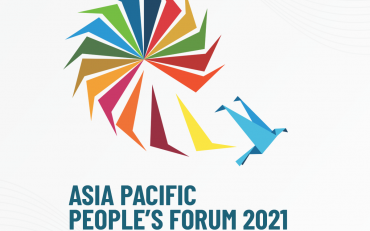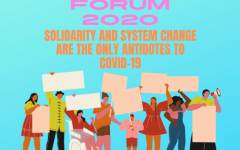MARCH 17-22, 2021
Context
Six years since the inception of the Agenda 2030, many nations across the world are not on track the implementation of the 17 Sustainable Development Goals (SDGs), with only less than ten years left before its target accomplishment. Looking closely at Asia and the Pacific, many governments and stakeholders across the region who are promoting the SDGs are heavily disjointed with their constituencies in working towards the achievement of the goals. Its detachment to the reality on the ground and its tokenistic and selective approach to the goals have only strayed away from the path to genuine and transformative development.
On top of these pre-existing circumstances, there's a multitude of setbacks the region is facing - from the public health crisis of the COVID-19 pandemic to further widening of wealth inequality, environmental and climate crisis as well as the worsening human rights situation in many nations. The conditions present in the region demand a more holistic and people-centred approach to be on track for Agenda 2030.
Civil society organizations (CSOs) and people’s movements across the region have critically engaged governments, the UN, and intergovernmental organizations in achieving sustainable development and development justice. Their commitment to raising the bar on how state actors should see the fulfilment of the goals from the people’s perspective is pivotal to how nations can strategically map out their policies amidst a multitude of crises.
One policy engagement platform that discusses the Agenda 2030 is the Asia Pacific Forum on Sustainable Development (APFSD), a regional forum that aims to provide regional perspectives on the implementation as well as follow up and review of the progress of the 2030 Agenda. This year’s theme is “Sustainable and resilient recovery from the COVID-19 pandemic in Asia and the Pacific”. The theme aims to foster discussion on the regional execution of the Agenda 2030 and conduct an in-depth review of 9 specific goals: SDGs 1 (No poverty), 2 (Zero Hunger), 3 (Good health and well-being), 8 (Decent work and economic growth), 10 (Reduced inequalities), 12 (Responsible consumption and production), 13 (Climate action), 16 (Peace, justice, and strong institutions) and 17 (Partnerships) as well as the regional follow-up and review for the VNR countries (Bhutan, China, Japan, Indonesia, Laos, Malaysia, Myanmar, Thailand, Pakistan) this year.
In preparation for the engagement in the annual APFSD, the Asia Pacific Peoples’ Forum on Sustainable Development (APPFSD), organized by the Asia Pacific Regional CSO Engagement Mechanism (APRCEM), provides an inclusive space for discussion and sharing among civil society organizations (CSOs) and peoples’ movements in the region on their positions on key sustainable development issues. The APPFSD carves its space against a backdrop of shrinking civic spaces and the digital divide brought upon the COVID-19 pandemic. The forum aims to serve as a platform that harnesses the collective voice of the region towards transformative and genuine development that serves the needs of the most marginalized.
This year’s forum builds on the previous year’s insights from the Peoples’ Forum “Solidarity and System Change are the Only Antidotes to COVID-19” and will discuss the regional progress of the SDGs and the Agenda 2030 from the constituency’s perspective; challenging the framework of its implementation and sharpening its analysis through the lens of Development Justice.
Target audience
The intended participants are mainly CSOs and people’s movements from Asia-Pacific engaged in sustainable development at the local, national, and regional levels working on economic, social, and environmental issues. With APRCEM’s structure covering 5 sub-regions and 17 constituencies), the Peoples’ Forum will reach out to a broader number of CSOs to encourage new and relevant organizations to engage with regional civil society efforts on sustainable development, as well as engage with the UN mechanisms and institutions.
The forum aims to consolidate and engage more than a hundred participants from different organizations in the Asia Pacific, with consciousness to thematic, sectoral, and gender representation to cultivate a diversity of perspectives and stories from sectors. Geographical scope includes organizations from (1) Pacific, (2) East/North-East Asia, (3) North/Central Asia, (4) South/Southwest Asia, (5) Southeast Asia. Participation will include grassroots and local organizations as well as national and regional organizations from the following groups: (1) NGOs, (2) Women, (3) Youth, (4) Social and Community Enterprise, (5) Farmers, (6) Trade Union/Workers, (7) Science and Technology, (8) Indigenous Peoples, (9) Urban Poor, (10) Migrants, (11) Persons With Disability, (12) People living and affected by HIV and AIDS, (13) LGBTI, (14) Older People, (15) People affected with conflicts and disasters, and (16) Fisherfolks and 17) Dalits. CSOs across thematic areas relevant to sustainable development are also targeted as participants.
We welcome applications from those who are based in Asia and the Pacific and from civil society organizations working on the 2030 Agenda and sustainable development processes, and especially those who are:
-
Members of grassroots constituencies, and/or working directly with grassroots constituencies;
-
Engaged in implementation and promotion of the SDGs and the Agenda 2030 specifically for goals 1, 2, 3, 8, 10, 12, 13, 16, and 17; and,
-
Engaged in the 2030 Agenda and SDG-related processes on the global/regional/national/local level, including but not limited to civil societies coming from countries delivering VNR in 2021: Bhutan, China, Japan, Indonesia, Laos, Malaysia, Myanmar, Thailand, Pakistan.
About APRCEM
APRCEM is a civil society platform aimed to enable stronger cross constituency coordination and ensure that voices of all subregions of Asia Pacific are heard in intergovernmental processes at the regional and global levels. The platform is initiated, owned, and driven by the CSOs, and seeks to engage with UN agencies and the Member States across the region on the issue of sustainable development. As an open, inclusive, and flexible mechanism, RCEM is designed to reach the broadest number of CSOs in the region, harness the voice of grassroots and peoples’ movements to advance development justice that address the inequalities of wealth, power, resources between countries, between rich and poor and between men and women.
Objectives:
-
Foster sharing and learning from the variety of experiences of organizations and constituencies and enhance the capacity of civil society participants on sustainable development at the national, regional and global levels and on the opportunities and modalities for engaging these processes, including identifying and dealing with key systemic issues/barriers to the achievement of sustainable development from Development Justice perspectives;
-
Build a deeper understanding of Development Justice and its position on sustainable development as a comprehensive whole with strong inter-linkages across its various dimensions and components; therefore, to also link the work of various other CSO campaigns, peoples’ movements, grassroots constituencies, scientific and academic communities across national borders;
-
Conduct dialogues on the structure and content of the APFSD and HLPF with its theme “Sustainable and Resilient Recovery to COVID-19” formulate joint positions, as well as strategize interventions at the APFSD, HLPF, UN General Assembly, FFD and other processes related to the 2030 Agenda, as well as other relevant processes in tackling systemic barriers in achieving Development Justice;
-
Reflect on the work and structure of Asia Pacific Regional CSO Engagement Mechanism and agree on joint actions and follow up to civil society positions adopted to strengthen and support each other's ideas, plans, and actions across national borders.
>> Download Asia Pacific Disability Constituency, Asia Pacific Regional Civil Society Engagement Mechanism (APRCEM) Terms of Reference (ToR) here.
>> Download the document on 'Roles and Responsibilities' and the Asia Pacific Disability Constituency Focal Point here.
>>Find a full agenda here.
>> To learn more about Asia Pacific Peoples’ Forum For Sustainable Development 2021, please click here.
>> To learn more about Asia Pacific Disability Constituency on Sustainable Development, please click here.


